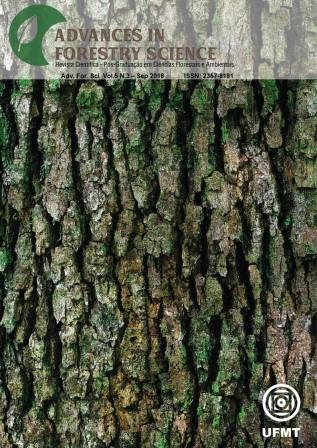Production efficiency of charcoal producers in Odeda local government area, Ogun State, Nigeria
DOI:
https://doi.org/10.34062/afs.v5i3.5265Keywords:
Earthen method, Income, Wage rate, Technical efficiency, Forest policyAbstract
This study examined the production efficiency of charcoal producers in Odeda local government area of Ogun-state, Nigeria. Multistage sampling technique was adopted and data were collected from 80 respondents using structured questionnaire. Descriptive statistics was used to analyse socio-economic characteristics of the respondents and Stochastic Production Frontier (SPF) to evaluate the technical (TE), allocative (AE) and economic (EE) efficiency of the respondents and to identify factors affecting efficiency. The results revealed that the respondents were all male with mean age of 40.9 years, married- (78.8%) and average household size of 5 persons. Primary education was predominant (80%), mean years of experience (18 years), method of production was earthen only with mean household annual income of ₦717,929.38. A total of 16 hard wood species in ten families were identified for charcoal production. Leguminosae family with five species (31%) recorded the highest number of species. The mean TE, AE and EE were 0.8136, 0.8134 and 0.9998, respectively. The SPF estimates showed that Tree volume was negatively significant (p<0.1), Labour and fuel were positively significant (p<0.01) and (p<0.05) respectively. The gamma (γ) value of 91.76% indicates variation in output due to differences in technical efficiency. In relation to AE, Cost of trees and Wage rate were positively significant (p<0.01), Cost of fuel was negatively significant (p<0.05) while the Cost of transporting logs was insignificant (p>0.1). Conclusively, there is opportunity for increasing production by 18.6% using better technique to reduce inefficiency. Forest policy should ensure conservation and sustainable production through extension services.
Downloads
References
Abdulai A., and Eberlin R. (2001). Technical efficiency during economic reform in Nicaragua: Evidence from farm household survey data. Economic Systems 25 (2): 113-125
Adeniyi A. 1995. Charcoal production in Delta State. Kahney Books, Asaba, Nigeria
Adinya IB.; Afu, SM. and Ijoma, J.U. (2010): Economic meltdown and decline in Pineapple production: determinant of production inefficiency of pineapple based alley cropping practices in Cross River State, Nigeria. The Journal of Animal and Plants Science, Pakistan, Islama 20(2): 11
Adinya IB. (2011b). An Econometric investigation of Technical Efficiency from stochastic frontier function in Tilapia (Oreochromis mossambians) and Cichild (Oreochromis aureus) production in Cross River State, Nigeria. Econometric views in Aqual- field Researches Journal 1(1): 18-36
Baland JM, Bardhan P, Das S, Mookherjee D, and Rinki S. 2004. The environmental impact of poverty: Evidence from firewood collection in rural Nepal. 10th Biennial conference paper of the Int. Association for the study of commom property (IASCP), Oaxaca, Mexico, August, 2004
Barmon, BK. 2013. Technical efficiency and total factor productivity of MV paddy production under different farming systems in Bangladesh. Asia- Pacific Journal of Rural Development, 23 (1): 59- 78
Coelli TJ, Rahman S., and Thirtle C. (2002). Technical, allocative, cost and scale efficiencies in Bangladesh rice cultivation: A non parametric approach. Journal of Agricultural Economics 53 (3): 607-626
Charnes A, Cooper WW, and Rhodes E. 1981.Evaluating program and managerial efficiency: an application of data envelopment analysis to program follow through. Management Science 27 (6): 668-697
Essiet D. (2009): Future charcoal export business. The Nation Newspaper. http:/thenationonlineng.net/web2articles. Retrieved September 6, 2014
FAO, 1987. Small scale forest based processing enterprises: An Overview. Food and Agriculture Organisation. FAO, Rome, Italy.
FAO, 2010. Simple technologies for charcoal making. Food and Agriculture Organisation, Rome, Italy. www.fao.org/docirep Retrieved 15/11/2014
FAO, 2011a. Highlights on woodfuel: 2004-2009. FAO Forestry Department, Food and Agriculture Organisation, Rome, Italy. FAOSTATForesSTAT Retrieved 15/11/2014
Farrell M J. (1957). “The measurement of productive efficiency”, Journal of the Roy Statistical Society, A CXX, Part 3, 253-290.
Ghilardi A.,and Steierer F. 2011. Charcoal production and use: World country statistics and global trends. A symposium on the role of charcoal in climate change and poverty alleviation initiatives. Arushai, Tanzania. 15th June, 2011
Huynh VK, and Mitsuyasu Y. 2011. Technical efficiency analysis of rice production in Vietnam. Journal of ISSAAS, 17 (1): 135-146
Kalu C., and Izekor DN. (2007). Charcoal enterprise in Benin- City, Edo state, Nigeria. Journal of Applied Science and Environmental Management. 11 (3): 63-67.
Kammen, DM. and Lew DJ. (2005): Review of Technologies for the production and use of charcoal. Renewable and appropriate energy laboratory report. 19pp.
Karimov A., Awotide BA.,and Amos TT. (2014). Production and scale efficiency of maize farming households in southwest Nigeria. International Journal of Social Economics 41 (11) : 1087- 1099
Kwasi OA, Owusu A, Imoro B, and Stephen L. 2012. Commercial charcoal production and sustainable community development of the Upper West Region, Ghana. Journal of Sustainable development 5(4): 1-16
NBS, 2009. Facts and Figures about Nigeria. National Bureau of Statistics, Abuja, Nigeria.
Rensselear R, 2009. Charcoal production in the Democratic Republic of Congo. www.american/edu/TED/charcoal. Retrieved 10/9/2016
The Consulting (2011): Secrets on wood charcoal export. www.thethyconsulting.com. UN-DESA. Final Report. Africa Energy Policy Research Network, Nairobi, Kenya. 54pp.
Downloads
Published
Issue
Section
License
All copyright must be assigned to the Federal University of Mato Grosso.

